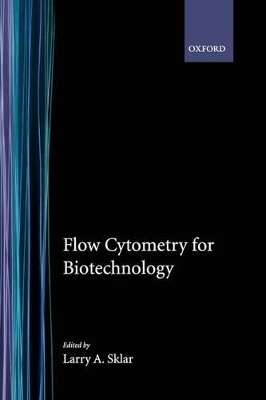
Flow Cytometry for Biotechnology
Oxford University Press Inc (Verlag)
978-0-19-515234-0 (ISBN)
Flow cytometry is a sensitive and quantitative platform for the measurement of particle fluorescence. In flow cytometry, the particles in a sample flow in single file through a focused laser beam at rates of hundreds to thousands of particles per second. During the time each particle is in the laser beam, on the order of ten microseconds, one or more fluorescent dyes associated with that particle are excited. The fluorescence emitted from each particle is collected through a microscope objective, spectrally filtered, and detected with photomultiplier tubes.
Flow cytometry is uniquely capable of the precise and quantitative molecular analysis of genomic sequence information, interactions between purified biomolecules and cellular function. Combined with automated sample handling for increased sample throughput, these features make flow cytometry a versatile platform with applications at many stages of drug discovery. Traditionally, the particles studied are cells, especially blood cells; flow cytometry is used extensively in immunology.
This volume shows how flow cytometry is integrated into modern biotechnology, dealing with issues of throughput, content, sensitivity, and high throughput informatics with applications in genomics, proteomics and protein-protein interactions, drug discovery, vaccine development, plant and reproductive biology, pharmacology and toxicology, cell-cell interactions and protein engineering.
Larry Sklar is Regents Professor of Pathology at the University of New Mexico. He is also Director of Basic Research at the University of New Mexico Cancer Research and Treatment Center.
Contributors
1: Larry A. Sklar: The Future of Flow Cytometry in Biotechnology
Part I. Tools for Flow Cytometry
2: Howard M. Shapiro: Fluorescent Probes
3: Bruce S. Edwards and Larry A. Sklar: Automation and High Throughput Flow Cytometry
4: David Basiji: Multispectral Imaging in Flow: A Technique for Advanced Cellular Studies
5: Anne Y. Fu, Yohie Yokobayashi, Frances H. Arnold, and Stephen R. Quake: Elastomeric Microfabricated Fluorescence-Activated Cell Sorters
6: Tione Buranda, Larry A. Sklar, and Gabriel P. Lopez: Flow Cytometry, Beads, and Microchannels
7: Babetta L. Marrone, Robert C. Habbersett, James H. Jett, Richard A. Keller, Xiaomei Yan, and Thomas M. Yoshida: DNA Fragment Sizing by High-Sensitivity Flow Cytometry: Applications in Bacterial Identification
8: Adam Treister: A Guide to Informatics and Flow Cytometry
9: Steven W. Graves, John P. Nolan, and Larry A. Sklar: Molecular Assemblies, Probes, and Proteomics in Flow Cytometry
Part II. Biological Applications
10: Mario Roederer and Stephen C. De Rosa: Multiparameter Analysis: Application to Vaccine Analysis
11: Erlina Pali, Mark Powell, Esteban Masuda, Yasumichi Hitoshi, Sasha Holland, Mark K. Bennett, Susan M. Molineaux, Donald G. Payan, and James B. Lorens: FACS-based High-Throughput Functional Screening of Genetic Libraries for Drug Target Discovery
12: George Georgiou, Barrett R. Harvery, Karl E. Griswold, and Brent L. Iverson: Applications of Flow Cytometry in Protein Engineering
13: Duane L. Garner and George E. Seidel, Jr.: Applications of Flow Cytometry in Animal Reproduction
14: John P. Nolan, Alina Desphande, and Feng Zhou: Genetic Analysis Using Microsphere Arrays
15: Scott W. Burchiel and James L. Weaver: Uses of Flow Cytometry in Preclinical Safety Pharmacology and Toxicology
16: David W. Galbraith, Jan Bartos, and Jaroslav Dolozel: Flow Cytometry and Cell Sorting in Plant Biotechnology
17: Peter Simons, Charlotte M. Vines, T. Alexander Key, Ross M. Potter, Mei Shi, Larry A. Sklar, Eric R. Prossnitz: Analysis of GTP-Binding Protein-Coupled Receptor Assemblies by Flow Cytometry
18: Richard S. Larson, Alexandre Chigaev, Bruce S. Edwards, Sergio A. Ramirez, Stuart S. Winter, Gordon Zwartz, Larry A. Sklar: Applications of Flow Cytometry to Cell Adhesion Biology: From Aggregates to Drug Discovery
Index
| Erscheint lt. Verlag | 29.9.2005 |
|---|---|
| Zusatzinfo | Numerous halftones and line illustrations |
| Verlagsort | New York |
| Sprache | englisch |
| Maße | 231 x 155 mm |
| Gewicht | 553 g |
| Themenwelt | Informatik ► Weitere Themen ► Bioinformatik |
| Naturwissenschaften ► Biologie ► Genetik / Molekularbiologie | |
| Naturwissenschaften ► Biologie ► Zellbiologie | |
| Technik ► Umwelttechnik / Biotechnologie | |
| ISBN-10 | 0-19-515234-4 / 0195152344 |
| ISBN-13 | 978-0-19-515234-0 / 9780195152340 |
| Zustand | Neuware |
| Informationen gemäß Produktsicherheitsverordnung (GPSR) | |
| Haben Sie eine Frage zum Produkt? |
aus dem Bereich


